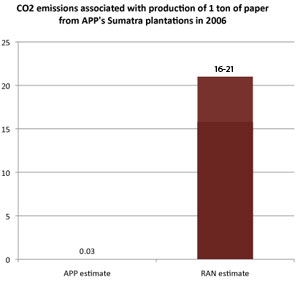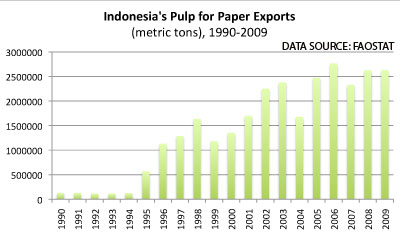Paper products giant Asia Pulp & Paper (APP) will undertake a human rights audit across its Indonesian operations.
The move, which APP says is an acknowledgment of a recent United Nations call for the global protection of human rights by businesses, comes as APP intensifies its effort to improve its image abroad. APP, a brand for paper products manufactured by several subsidiaries in Indonesia, has been beset by criticism from environmental and human rights group over its development of timber plantations on the island of Sumatra. The complaints have cost APP a number of prominent customers.
“APP has committed itself to adopting this framework in assessing and addressing human rights policies throughout its operations,” Aida Greenbury, Managing Director at APP told mongabay.com (see Greenbury’s full responses at the bottom of the article). “Once the one year long audit is completed, APP is planning to share the summary of the audit along with the eight core principles to assess human rights policies and performance.”
The audit will be conducted by Mazars Indonesia, a subsidiary of Mazars, an auditing and consulting firm headquartered in France.
 Rainforest (left) and Eucalyptus plantation in Sumatra. Photo by Daniel Beltrá / Greenpeace |
Mazars says it has developed a “proprietary” tool to assess human rights policies and performance. The tool is “based on and refers to the most relevant national and international standards, including prevailing Indonesian labor-related law and regulations, Universal Declaration on Human Rights (UDHR), Organization for Economic Cooperation and Development (OECD) guidelines for multinational enterprises, and around 80 Human Rights and International Labor Organization (ILO) conventions and declarations,” according to the firm.
Mazars says the audit includes “an assessment of the company’s formal policies to address these issues and then follows with implementation through every aspect of the organization, including the supply chain.”
APP adds that the audit is part of an effort to “assess all aspects of [its] sustainability performance.”
If APP finds evidence of human rights violations in its supply chain, rather than immediately cut off suppliers, it will engage them to help resolve any issues, according to Greenbury.
“We don’t believe that cutting off suppliers without trying to address their concerns is a responsible action,” she told mongabay.com.
 A 2010 report from the Rainforest Action Network (RAN) and the Japan Tropical Forest Action Network (JATAN) estimated carbon dioxide emissions from APP’s paper production at several levels of magnitude beyond what APP claimed. Overall the report estimated APP’s total net emissions (emissions offset by carbon sequestration by its plantations) at 67-86 million tons of CO2e in 2006, or more than that of 165 countries. At this time, APP said the report “grossly exaggerates and misstates APP’s carbon footprint”. |
It is not the first time Mazars Indonesia has worked with APP. Last year Mazars “audited” a report APP issued in response to WWF and Greenpeace over environmental concerns. However the report contained some controversial statements, including APP’s assertion that its pulp and paper production is near carbon neutral. APP cited a carbon footprint analysis by ERM, a global consulting firm, but failed to note the limitations of the work. ERM later issued a statement (since removed from its web site) that disputed APP’s representation of the analysis. Environmental groups said ERM’s scope excluded emissions from land use change, including conversion of rainforests and peatlands into plantations. Furthermore, the report downplayed APP’s role in conversion of natural forests to plantations and didn’t acknowledge concerns over illegal timber sourcing by APP’s suppliers in Riau (Indonesia’s Anti-Mafia Law Task Force have since recommended the case be re-opened). Nevertheless Mazars Indonesia signed off on the report. APP has since announced it would complete a more comprehensive assessment of greenhouse gas emissions.
Whether APP’s human rights audit will help stem criticism from campaigners remains to be seen. However David Gilbert, a researcher at Stanford University who has worked extensively in Sumatra on plantation issues, cautiously welcomed the move.
“This is an important step in the process of addressing the social impacts of APP’s operations in Indonesia, where the company’s timber plantations impact the lives of hundreds of thousands of Indonesians,” he told mongabay.com. “Auditing the impacts of these industrial timber plantations – with special attention to dynamics of economic equity, labor, migration, gender – up and down the commodity chain is a necessary step in the effort to reign in the negative consequences of the pulp and paper industry in Sumatra and Borneo.”
But Gilbert warned that the audit would need to be closely scrutinized.
“As we have seen in previous experiences with Asia Pulp and Paper and their parent holding group Sinar Mas, the audit process can be manipulated and undermined to the extent that no real improvements occur in daily operating procedures,” he said.
Gilbert said a recent audit by the Sinar Mas Group’s palm oil company exemplified for his concern.
“[The audit] patently claimed that there was no social conflict or resistance to ongoing expansion nor longterm poverty at many plantation communities [yet] I visited many of the locations featured in the ‘Social Research Report’ overt the past few months, where in my experience discontent and poverty were quite evident.”
 |
Gilbert’s concerns were echoed by another observer, who wasn’t willing to have their name used on the record, but has conducted extensive research on social conflict and plantation development in Sumatra.
“In the past APP has tried to use the fact that they have ‘a policy’ as good enough to deal with an issue,” said the researcher. “In addition to transparency and community participation, accountability and enforcement in implementation of any policy is obviously a critical aspect of compliance.”
The researcher also noted that APP has been criticized for its alleged use of private and state security forces in the past. APP has always denied the allegations, but a 2003 report by Human Rights Watch asserted that under Suharto, Indonesia’s former dictator, pulp and paper suppliers used rough tactics to acquire holdings for plantations.
“The vast plantations supplying Asia Pulp & Paper (APP)… were established in Riau during the 1980s and 90s largely on land unlawfully seized from indigenous Malay and Sakai communities, without due process and with little or no compensation,” stated Human Rights Watch’s Without Remedy: Human Rights Abuse and Indonesia’s Pulp and Paper Industry. “These land seizures took place under intimidation by armed police and military agents.”
However APP’s Greenbury says the new audit would show that “due diligence with [stakeholder] input is part of our everyday business.”
She added that “companies that earn the respect and loyalty of employees and community partners are far more likely to succeed as global leaders over the long term.”
Greenbury hoped that the new audit would help APP toward that goal.
“We know that the audit is just the first step. What’s most important is what we do with the results. We expect we are going to find that there are some areas where we perform very well and others where we need stronger policies and more education throughout our company,” she said. “We are starting down this path with a commitment to make sure that our entire organization understands and respects the importance we place on our people and the communities in which we work.”
|
Q&A with APP’s Aida Greenbury mongabay: Will this audit and its criteria and methodology be made public? Aida Greenbury: In June, the United Nations Human Rights Council endorsed for the first time a set of publicly available guiding principles for business on human rights performance using the “protect, respect and remedy” framework. APP has committed itself to adopting this framework in assessing and addressing human rights policies throughout its operations. These new “Corporate Responsibility to Protect” principles provide a blueprint for companies on how to know and show they are respecting human rights. The Guiding Principles for Business and Human Rights outline how states and businesses should implement the UN “Protect, Respect and Remedy” framework in order to better manage business and human rights challenges. The principles are the result of six years of research led by Professor Ruggie of Harvard University, involving governments, companies, business associations and civil societies around the world. They are designed to ensure both human rights protections as well as providing clear course for conflict resolution. Once the one year long audit is completed, APP is planning to share the summary of the audit along with the eight core principles to assess human rights policies and performance. Mazar’s assessment tool is also based on and refers to the most relevant national and international standards, including the publicly available Indonesian labor-related law and regulations, Universal Declaration on Human Rights (UDHR), Organization for Economic Cooperation and Development (OECD) guidelines for multinational enterprises, and around 80 Human Rights and International Labor Organization (ILO) conventions and declarations. mongabay: How does APP plan to treat the question of FPIC? For example, how APP is dealing with land conflicts and community social agreements, and what is the remedy for disputes? Aida Greenbury: FPIC is the new concept that APP has been studying. We believe that many elements under FPIC are captured in many assessments prior to and during the development of pulpwood plantations, for example. These assessments include: Environmental Impact, High Conservation Value Forest, Sustainable Forest Management and other internal Community Assessments. We believe that an adoption of a new concept like FPIC should be reviewed and implemented according to the existing mechanisms currently operating in Indonesia, with assessments for areas of improvement as part of a continuous process. APP’s community engagement procedures are based on stakeholders’ input, empowerment and mutual benefit. The implementation needs to be done according to the legal framework here in Indonesia. Should the Human Rights audit reveal community issues that require our attention, we will develop action plans to address them at once. mongabay: Will the audit apply to APP’s direct suppliers or all entities within its entire supply chain? Will there be a due diligence procedure to ensure APP is not buying wood from a source that is violating human rights? Aida Greenbury: APP is initiating a comprehensive human rights audit which is unique in the pulp and paper industry worldwide. APP is heeding the United Nations call for the global protection of human rights by businesses around the world. The guiding principles for business on human rights performance were endorsed by the first time by the United Nations Human Rights Council only in June, 2011. We have yet to hear a similar approach taken by another major player in the pulp and paper industry. As with any other businesses adopting a major new policy and practice, the audit will be implemented in phases. The first stage is, of course, APP’s operations and its surrounding area. Due diligence with stakeholders input is part of our everyday business. That said, we don’t believe that cutting off suppliers without trying to address their concerns is a responsible action. If we find any human rights violation in our supply chain, we will do everything we can to engage our suppliers to help resolve the matters together with other stakeholders. mongabay: How will APP ensure that its policy goes beyond just being a policy on paper and is actually implemented and enforced? Aida Greenbury: While we feel confident that APP is performing well against many of the dimensions, the notion of a human rights audit is new, having just recently been introduced by the UN. We have undertaken this audit with the express intent to continue to improve the company. Alongside any issues that might surface in the audit will be recommendations to address the changes required for compliance – be they policy or otherwise. This audit has the support from all levels of management at APP; as such we will require that operational changes be implemented should issues reveal themselves in the auditing process. We are also planning to have our operations audited on a periodical basis. In that way, continual improvement can be measured and reported in our Sustainability Report. |
Related articles